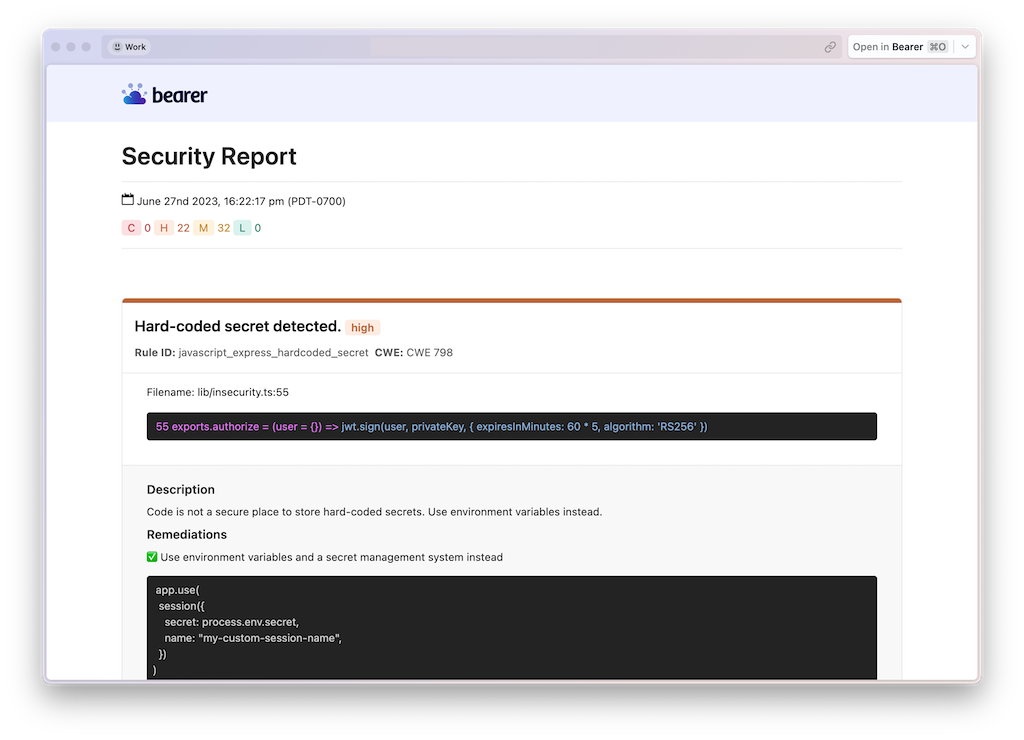Configure the scan to meet your needs
Bearer CLI offers a variety of ways to configure the core scan command to best meet your needs. Here are some common situations. For a full list of options, see the commands reference. For many of the command flags listed below, you can also define them in your bearer.yml config file.
Select a report type
There are a variety of report types to choose from. Bearer CLI defaults to the Security report, but you can select any other type with the --report flag.
bearer scan . --report privacySelect a scanner type
Did you know that Bearer CLI can also detect hard-coded secrets in your code? In addition to the default SAST scanner, there's a built-in secrets scanner. Use the --scanner flag to change scanner types.
bearer scan . --scanner secretsOnly report new findings on a branch
When scanning a Git repository, you can choose to only report new findings that have been introduced, relative to a base branch. Any findings that already existed in the base branch will not be reported.
Use the --diff flag to enable differential scanning. The repository's default
branch will be used as the base branch for comparison. You can override this by
setting the BEARER_DIFF_BASE_BRANCH environment variable.
git checkout my-feature
BEARER_DIFF_BASE_BRANCH=base-branch bearer scan --diff .If the base branch is not available in the git repository, it's head will be fetched by Bearer CLI (a shallow fetch of depth 1).
See our guide to using the GitHub action and guide to using GitLab for information on using this feature with those services.
Ignore specific findings
Every finding is associated with a unique fingerprint visible directly in the CLI output, for example:
HIGH: SQL injection vulnerability detected. [CWE-89]
https://docs.bearer.com/reference/rules/javascript_lang_sql_injection
To ignore this finding, run: bearer ignore add 4b0883d52334dfd9a4acce2fcf810121_0
...If a finding is not relevant, you can ignore it automatically from future scans using the bearer ignore add command. This adds the finding's fingerprint to your ignore file. You can also provide optional author information or a comment:
bearer ignore add 4b0883d52334dfd9a4acce2fcf810121_0 \
--author="Mish Bear" \
--comment="Ignore this finding"
--false-positiveSkip or ignore specific rules
Sometimes you want to ignore one or more rules, either for the entire scan or for individual blocks of code. Rules are identified by their id, for example: ruby_lang_exception.
Skip rules for the entire scan
To ignore rules for the entire scan you can use the --skip-rule flag with the scan command.
Using --skip-rule:
# skip a single rule
bearer scan . --skip-rule ruby_lang_exception
# skip multiple rules
bearer scan . --skip-rule ruby_lang_exception,ruby_lang_cookiesUsing bearer.yml
rule:
skip-rule: [ruby_lang_exception, ruby_lang_cookies]Skip rules for individual code blocks
Bearer CLI supports comment-based rule skipping using the bearer:disable comment. To ignore a block of code, place the comment immediately before the block.
In ruby:
# bearer:disable ruby_lang_logger, ruby_lang_http_insecure
Net::HTTP.start("http://my.api.com/users/search) do
logger.warn("Searching for #{current_user.email}")
...
endIn javascript:
// bearer:disable javascript_lang_logger
function logUser(user) {
log.info(user.name)
}To ignore an individual line of code, place the comment immediately before the line.
def my_func
# bearer:disable ruby_rails_logger
Rails.logger(current_user.email)
endfunction logUser(user) {
log.info(user.name)
// bearer:disable javascript_lang_logger
log.info(user.uuid)
}Run only specified rules
Similar to how you can skip rules, you can also tell the scan to only run specific rules. To do so, specify the rule IDs with the --only-rule flag.
bearer scan . --only-rule ruby_lang_cookiesLimit severity levels
Depending on how you're using Bearer CLI, you may want to limit the severity levels that show up in the report. This can be useful for triaging only the most critical issues. Use the --severity flag to define which levels to include from the list of critical, high, medium, low, and warning.
bearer scan . --severity critical,highForce a given exit code for the scan command
If you want to force a successful exit code even when findings are reported, use the --exit-code flag and set it to 0. It's particularly useful if you want to perform a scan and report findings without failing your CI or CD pipeline.
bearer scan . --exit-code 0Change the output format
Each report type has a default output format, but in general you're able to also select between json and yaml with the --format flag.
bearer scan . --format yamlOutput to a file
Sometimes you'll want to hand off the report, and while you could pipe the results to another command, we've included the --output flag to make it easier. Specify the path to the output file.
bearer scan . --report dataflow --output dataflow.jsonGenerate a SARIF report
Bearer CLI offers SARIF output for tools that make use of the standard. To generate a security report in SARIF and write it to disk, use the --format and --output flags.
bearer scan . --format sarif --output sarif-report.sarifIf you're using GitHub or GitLab, you can use our integrations to send SARIF reports directly to those services.
Format a report as HTML
Sometimes it's useful to have a nicely formatted HTML file to hand off to others. Security and privacy reports support the html format type. Pair the --format and --output flags to create and write an HTML file. It looks like this:

Run the commands together, replacing the scan location and the output path to match your needs:
bearer scan . --format html --output path/to/security-scan.htmlNext steps
For more ways to make the most of our Bearer CLI, check out the commands reference. Need additional help? Open an issue or join our Discord community.